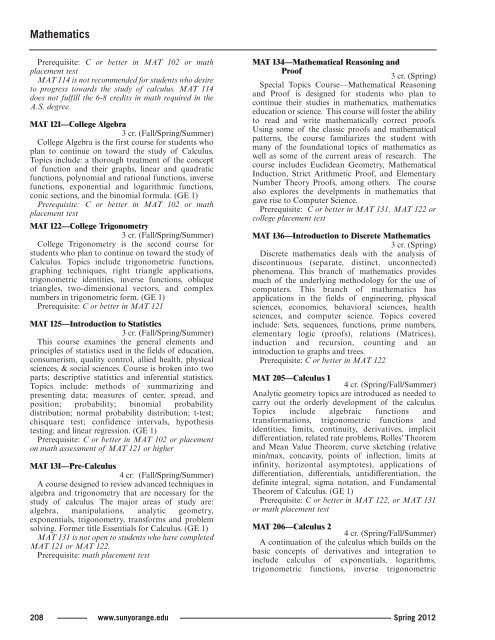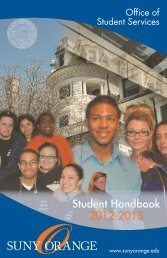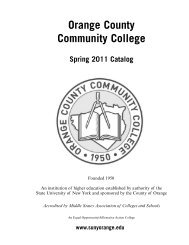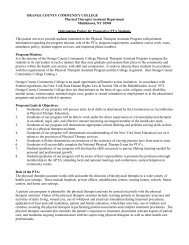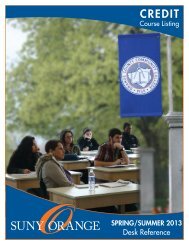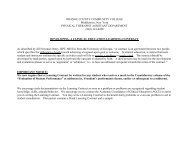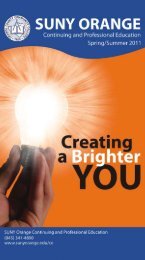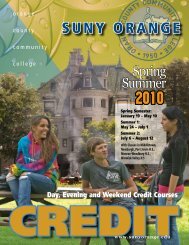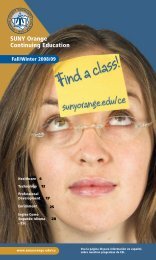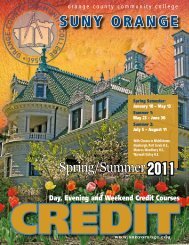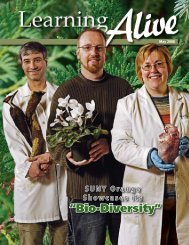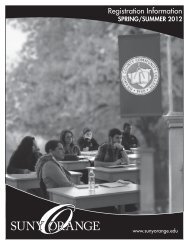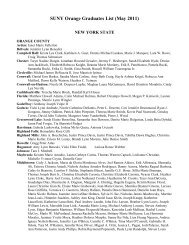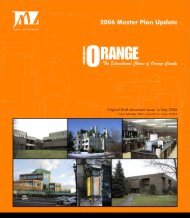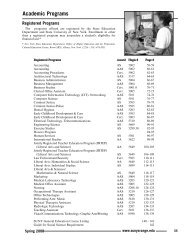You also want an ePaper? Increase the reach of your titles
YUMPU automatically turns print PDFs into web optimized ePapers that Google loves.
Mathematics<br />
Prerequisite: C or better in MAT 102 or math<br />
placement test<br />
MAT 114 is not recommended for students who desire<br />
to progress towards the study of calculus. MAT 114<br />
does not fulfill the 6-8 credits in math required in the<br />
A.S. degree.<br />
MAT 121—College Algebra<br />
3 cr. (Fall/Spring/Summer)<br />
College Algebra is the first course for students who<br />
plan to continue on toward the study of Calculus.<br />
Topics include: a thorough treatment of the concept<br />
of function and their graphs, linear and quadratic<br />
functions, polynomial and rational functions, inverse<br />
functions, exponential and logarithmic functions,<br />
conic sections, and the binomial formula. (GE 1)<br />
Prerequisite: C or better in MAT 102 or math<br />
placement test<br />
MAT 122—College Trigonometry<br />
3 cr. (Fall/Spring/Summer)<br />
College Trigonometry is the second course for<br />
students who plan to continue on toward the study of<br />
Calculus. Topics include trigonometric functions,<br />
graphing techniques, right triangle applications,<br />
trigonometric identities, inverse functions, oblique<br />
triangles, two-dimensional vectors, and complex<br />
numbers in trigonometric form. (GE 1)<br />
Prerequisite: C or better in MAT 121<br />
MAT 125—Introduction to Statistics<br />
3 cr. (Fall/Spring/Summer)<br />
This course examines the general elements and<br />
principles of statistics used in the fields of education,<br />
consumerism, quality control, allied health, physical<br />
sciences, & social sciences. Course is broken into two<br />
parts; descriptive statistics and inferential statistics.<br />
Topics include: methods of summarizing and<br />
presenting data; measures of center, spread, and<br />
position; probability; binomial probability<br />
distribution; normal probability distribution; t-test;<br />
chisquare test; confidence intervals, hypothesis<br />
testing; and linear regression. (GE 1)<br />
Prerequisite: C or better in MAT 102 or placement<br />
on math assessment of MAT 121 or higher<br />
MAT 131—Pre-Calculus<br />
4 cr. (Fall/Spring/Summer)<br />
A course designed to review advanced techniques in<br />
algebra and trigonometry that are necessary for the<br />
study of calculus. The major areas of study are:<br />
algebra, manipulations, analytic geometry,<br />
exponentials, trigonometry, transforms and problem<br />
solving. Former title Essentials for Calculus. (GE 1)<br />
MAT 131 is not open to students who have completed<br />
MAT 121 or MAT 122.<br />
Prerequisite: math placement test<br />
MAT 134—Mathematical Reasoning and<br />
Proof<br />
3 cr. (Spring)<br />
Special Topics Course—Mathematical Reasoning<br />
and Proof is designed for students who plan to<br />
continue their studies in mathematics, mathematics<br />
education or science. This course will foster the ability<br />
to read and write mathematically correct proofs.<br />
Using some of the classic proofs and mathematical<br />
patterns, the course familiarizes the student with<br />
many of the foundational topics of mathematics as<br />
well as some of the current areas of research. The<br />
course includes Euclidean Geometry, Mathematical<br />
Induction, Strict Arithmetic Proof, and Elementary<br />
Number Theory Proofs, among others. The course<br />
also explores the develpments in mathematics that<br />
gave rise to Computer Science.<br />
Prerequisite: C or better in MAT 131, MAT 122 or<br />
college placement test<br />
MAT 136—Introduction to Discrete Mathematics<br />
3 cr. (Spring)<br />
Discrete mathematics deals with the analysis of<br />
discontinuous (separate, distinct, unconnected)<br />
phenomena. This branch of mathematics provides<br />
much of the underlying methodology for the use of<br />
computers. This branch of mathematics has<br />
applications in the fields of engineering, physical<br />
sciences, economics, behavioral sciences, health<br />
sciences, and computer science. Topics covered<br />
include: Sets, sequences, functions, prime numbers,<br />
elementary logic (proofs), relations (Matrices),<br />
induction and recursion, counting and an<br />
introduction to graphs and trees.<br />
Prerequisite: C or better in MAT 122<br />
MAT 205—Calculus 1<br />
4 cr. (Spring/Fall/Summer)<br />
Analytic geometry topics are introduced as needed to<br />
carry out the orderly development of the calculus.<br />
Topics include algebraic functions and<br />
transformations, trigonometric functions and<br />
identities, limits, continuity, derivatives, implicit<br />
differentiation, related rate problems, Rolles' Theorem<br />
and Mean Value Theorem, curve sketching (relative<br />
min/max, concavity, points of inflection, limits at<br />
infinity, horizontal asymptotes), applications of<br />
differentiation, differentials, antidifferentiation, the<br />
definite integral, sigma notation, and Fundamental<br />
Theorem of Calculus. (GE 1)<br />
Prerequisite: C or better in MAT 122, or MAT 131<br />
or math placement test<br />
MAT 206—Calculus 2<br />
4 cr. (Spring/Fall/Summer)<br />
A continuation of the calculus which builds on the<br />
basic concepts of derivatives and integration to<br />
include calculus of exponentials, logarithms,<br />
trigonometric functions, inverse trigonometric<br />
208 www.sunyorange.edu Spring 2012


